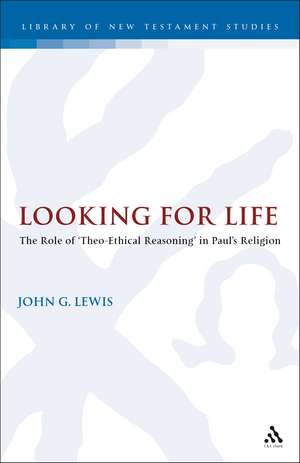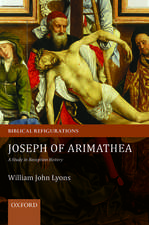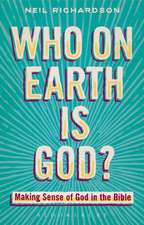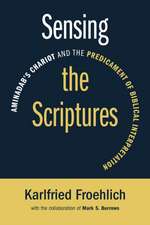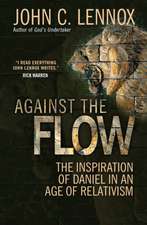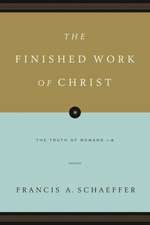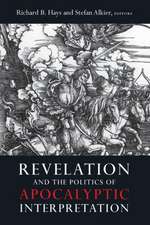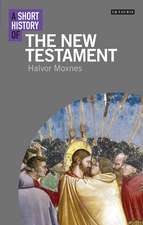Looking for Life: The Library of New Testament Studies
Autor John G. Lewisen Limba Engleză Hardback – 29 apr 2005
Din seria The Library of New Testament Studies
- 34%
 Preț: 509.52 lei
Preț: 509.52 lei - 22%
 Preț: 832.58 lei
Preț: 832.58 lei - 22%
 Preț: 832.09 lei
Preț: 832.09 lei - 24%
 Preț: 190.33 lei
Preț: 190.33 lei - 22%
 Preț: 832.65 lei
Preț: 832.65 lei - 23%
 Preț: 191.31 lei
Preț: 191.31 lei -
 Preț: 221.70 lei
Preț: 221.70 lei -
 Preț: 98.92 lei
Preț: 98.92 lei - 31%
 Preț: 830.87 lei
Preț: 830.87 lei - 22%
 Preț: 834.60 lei
Preț: 834.60 lei - 22%
 Preț: 831.59 lei
Preț: 831.59 lei - 30%
 Preț: 717.05 lei
Preț: 717.05 lei - 22%
 Preț: 835.03 lei
Preț: 835.03 lei - 30%
 Preț: 511.40 lei
Preț: 511.40 lei - 24%
 Preț: 190.33 lei
Preț: 190.33 lei -
 Preț: 158.77 lei
Preț: 158.77 lei - 30%
 Preț: 510.04 lei
Preț: 510.04 lei - 22%
 Preț: 832.99 lei
Preț: 832.99 lei - 30%
 Preț: 509.52 lei
Preț: 509.52 lei - 22%
 Preț: 832.80 lei
Preț: 832.80 lei - 22%
 Preț: 831.76 lei
Preț: 831.76 lei - 22%
 Preț: 834.93 lei
Preț: 834.93 lei - 22%
 Preț: 831.59 lei
Preț: 831.59 lei - 22%
 Preț: 832.41 lei
Preț: 832.41 lei - 22%
 Preț: 832.99 lei
Preț: 832.99 lei -
 Preț: 414.71 lei
Preț: 414.71 lei - 30%
 Preț: 773.65 lei
Preț: 773.65 lei - 22%
 Preț: 834.93 lei
Preț: 834.93 lei - 14%
 Preț: 511.81 lei
Preț: 511.81 lei -
 Preț: 222.16 lei
Preț: 222.16 lei - 30%
 Preț: 775.67 lei
Preț: 775.67 lei - 30%
 Preț: 1012.49 lei
Preț: 1012.49 lei - 30%
 Preț: 509.02 lei
Preț: 509.02 lei - 30%
 Preț: 656.90 lei
Preț: 656.90 lei -
 Preț: 469.92 lei
Preț: 469.92 lei -
 Preț: 471.68 lei
Preț: 471.68 lei -
 Preț: 173.21 lei
Preț: 173.21 lei - 30%
 Preț: 833.64 lei
Preț: 833.64 lei - 22%
 Preț: 834.93 lei
Preț: 834.93 lei - 31%
 Preț: 772.17 lei
Preț: 772.17 lei - 30%
 Preț: 774.20 lei
Preț: 774.20 lei - 14%
 Preț: 1124.92 lei
Preț: 1124.92 lei - 22%
 Preț: 948.51 lei
Preț: 948.51 lei - 14%
 Preț: 1128.84 lei
Preț: 1128.84 lei - 31%
 Preț: 1065.91 lei
Preț: 1065.91 lei - 22%
 Preț: 777.71 lei
Preț: 777.71 lei - 31%
 Preț: 1064.84 lei
Preț: 1064.84 lei - 22%
 Preț: 1063.44 lei
Preț: 1063.44 lei - 22%
 Preț: 889.49 lei
Preț: 889.49 lei - 22%
 Preț: 1006.06 lei
Preț: 1006.06 lei
Preț: 1125.99 lei
Preț vechi: 1309.29 lei
-14% Nou
Puncte Express: 1689
Preț estimativ în valută:
215.48€ • 233.98$ • 181.01£
215.48€ • 233.98$ • 181.01£
Carte tipărită la comandă
Livrare economică 22 aprilie-06 mai
Preluare comenzi: 021 569.72.76
Specificații
ISBN-13: 9780567042729
ISBN-10: 0567042723
Pagini: 320
Dimensiuni: 156 x 234 x 29 mm
Greutate: 0.6 kg
Editura: Bloomsbury Publishing
Colecția T&T Clark
Seria The Library of New Testament Studies
Locul publicării:London, United Kingdom
ISBN-10: 0567042723
Pagini: 320
Dimensiuni: 156 x 234 x 29 mm
Greutate: 0.6 kg
Editura: Bloomsbury Publishing
Colecția T&T Clark
Seria The Library of New Testament Studies
Locul publicării:London, United Kingdom
Cuprins
1 Theology and Ethics in Paul 2 Identifying Theo-Ethical Reasoning (1 Corinthians 1-4) 3 Engaging in Theo-Ethical Reasoning: Associating Experience with Conduct (1 Corinthians 5-16) 4 Engaging in Theo-Ethical Reasoning: Looking for Life in Christ and Not in Law (Galatians) Conclusion
Recenzii
'This book is to be recommended for some original analyses which are out of the common run of remarks that have become usual in the academic world.' Stefano Romanello, Biblica Vol. 88 FASC. 2-2007
"While Lewis correctly identifies "cruciformity" as the new behavioral paradigm for life, he goes too far in arguing that practicing spiritual discernment by engaging in theo-ethical reasoning is "the means by which believers unceasingly battle against6 sin throughout their lives, obtain forgiveness of sins, and avoid the imputation of sin for eternal condemnation" (p. 8)...Whether Lewis intends theo-ethical reasoning and cruciform acts to be the means for obtaining or only maintaining salvation, this non-Pauline perspective surely amounts to a works-salvation. Lewis has set aside one work for another, abandoning works of the law in favor of works of cruciformity...Having examined only two of Paul's letters, even two very different letters, it is inappropriate to argue that a certain pattern of reasoning is the Pauline norm..." -David Hutchinson, Bulletin for Biblical Research 18.2, 2008
"This book presents some helpful antidotes for the problems in understanding Paul's ethics that resulted from the Protestant Reformation...it helps us understand his calling to bring the nations to the obedience of faith." -Mark Reasoner, Journal of Religion, Oct. 2009
'...The author's decision to focus on what he identifies as the thought process behind each text allows him to develop a strong argument in general terms...of most interest to historians of early Christianity, particularly those with an interst in Pauline ethics. But the book should also appeal to those with interests in contemporary systematic theology and Christian ethics.'
"Lewis grapples with a number of fundamental issues in Pauline thinking and helps to move the debate forward in helpful ways." Paul Foster, Expository Times, 01/08/07
"While Lewis correctly identifies "cruciformity" as the new behavioral paradigm for life, he goes too far in arguing that practicing spiritual discernment by engaging in theo-ethical reasoning is "the means by which believers unceasingly battle against6 sin throughout their lives, obtain forgiveness of sins, and avoid the imputation of sin for eternal condemnation" (p. 8)...Whether Lewis intends theo-ethical reasoning and cruciform acts to be the means for obtaining or only maintaining salvation, this non-Pauline perspective surely amounts to a works-salvation. Lewis has set aside one work for another, abandoning works of the law in favor of works of cruciformity...Having examined only two of Paul's letters, even two very different letters, it is inappropriate to argue that a certain pattern of reasoning is the Pauline norm..." -David Hutchinson, Bulletin for Biblical Research 18.2, 2008
"This book presents some helpful antidotes for the problems in understanding Paul's ethics that resulted from the Protestant Reformation...it helps us understand his calling to bring the nations to the obedience of faith." -Mark Reasoner, Journal of Religion, Oct. 2009
'...The author's decision to focus on what he identifies as the thought process behind each text allows him to develop a strong argument in general terms...of most interest to historians of early Christianity, particularly those with an interst in Pauline ethics. But the book should also appeal to those with interests in contemporary systematic theology and Christian ethics.'
"Lewis grapples with a number of fundamental issues in Pauline thinking and helps to move the debate forward in helpful ways." Paul Foster, Expository Times, 01/08/07
